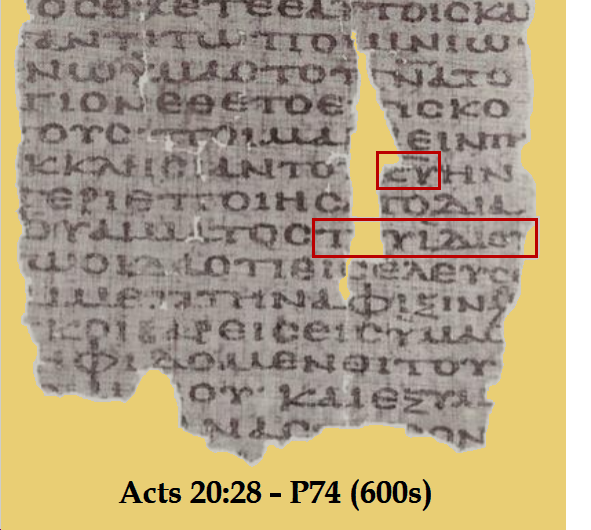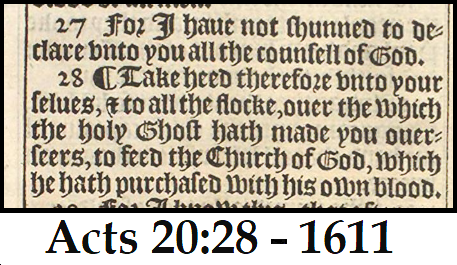Two textual issues in Acts 20:28 have impacted translations
of the verse: First: did Luke refer to the church as the “
Let’s review the external evidence:
Greek Support for ἐκκλησίαν τοῦ θεοῦ includes ﬡ B 056 614
1175 1611 104 2147 1505 Byz, Lectionary 60, l592,
l598, l603, l1021, and l1439. Versional support is provided by the Vulgate,
the Peshitta, the Harklean Syriac, the Georgian version, and itar, c, dem,
ph, ro, w and a Bohairic copy.
Patristic support for ἐκκλησίαν τοῦ θεοῦ is supplied by Athanasius,
Basil, Epiphanius, Chrysostom, Cyril, and Ambrose.
Greek
support for ἐκκλησίαν τοῦ κυρίου καί θεοῦ includes H L P C3 049 1 69
88 226 323 330 440 618 927 1241 1245 1270 1828 1854 2492 and most
lectionaries. Versional support is
limited to a Slavic lectionary copy.
(In
addition, Swanson recorded GA 1837’s ἐκκλησίαν τοῦ κυ ιυ καί θῦ.)
The KJV,
reflecting the Textus Receptus, reads
“Take heed therefore unto
yourselves, and to all the flock, over the which the Holy Ghost hath made you
overseers, to feed the
Similarly, the Christian Standard Bible reads “shepherd the
The World English Bible, following the
Byzantine Text, reads, “Take heed, therefore, to yourselves, and to all the
flock, in which the Holy Spirit has made you overseers, to shepherd the
assembly of the Lord and God which
he purchased with his own blood.”
Modern versions render Acts 20:28 in
quite diverse ways: usually the
base-text τοῦ θεοῦ is followed, not only in the English
Standard Version, NIV, EHV and CSB but also in the NET, RSV, NRSV, CEB, and
CEV.

Likewise the NRSV (including the compromised Updated
Edition) have Paul tell the Ephesian elders to “shepherd the
The Lexham English Bible likewise reads, “shepherd
the
English
versions which end Acts 20:28 with a clear reference to the blood of God’s Son
– even though the Greek equivalent of the
word “son” is not in the base-text – include the NWT, NET, RSV, NRSV, CEV,
Lexham, GNT, Mounce, The Voice,
and CEB.
In 1881 Hort wrote over three columns
of his Notes on Select Readings about
Acts 20:28 and concluded that “It is by no means impossible that ΥΙΟΥ dropped
out after ΤΟΥΙΔΙΟΥ at some very early transcription affecting all existing
documents. Its insertion leaves the
whole passage free from difficulty of any kind.” Metzger mentioned that Hort’s proposal is not
necessary – but no less than nine modern English versions appear to be
conformed to Hort’s proposed emendation!
Metzger dismissed the majority reading as “obviously conflate.” The Byzantine reading τοῦ κυρίου καί θεοῦ may account for both of the longer readings, however, if early scribes committed parablepsis, skipping from the –ou of κυρίου to the –ου of θεοῦ (producing ἐκκλησίαν τοῦ κυρίου), and some subsequently substituting θεοῦ in place of κυρίου, resisting the idea of God having blood.
The
Tyndale House Greek New Testament reads “ἐκκλησίαν τοῦ κυρίου” and concludes
with “αἵματος τοῦ ἰδίου.” Holmes’
SBL-GNT reads “ἐκκλησίαν τοῦ θεοῦ” and concludes the verse with “αἵματος τοῦ
ἰδίου.”
It
may be worthwhile to consider the thoughts of some who have approached the
textual issue from a pastoral perspective – for example Bob Luginbill, Sam Shamoun,
and the La
Vista Church of Christ (near
Considering that the longer reading’s earliest appearance is relatively late, and that ἐκκλησίαν τοῦ θεοῦ is supported by the Peshitta, the Vulgate, Chrysostom and Athanasius, ἐκκλησίαν τοῦ θεοῦ should be adopted, being early, geographically widely supported, and attested in multiple transmission-lines. GA 1739’s text may be adopted for the entire verse.
English readers should be aware that at least eight modern versions essentially echo a conjectural emendation in this verse.


No comments:
Post a Comment